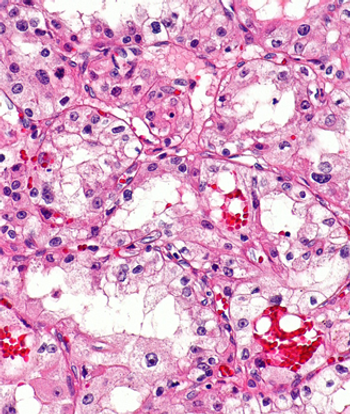
Colorectal Cancer
Latest News

Latest Videos

CME Content
More News

A comprehensive discussion on treatment decision-making for patients with colorectal cancer following the IDEA collaboration analysis.

Findings from the phase 3 FRESCO-2 trial support fruquintinib plus best supportive care as a global treatment option for patients with refractory metastatic colorectal cancer.

The expert panel discusses how MRD positivity affects treatment decisions for patients with colorectal cancer.

Experts on colorectal cancer present a patient case, offer their initial impressions, and discuss disease staging.

The agent appears to be less effective among patients with HER2-low disease, according to final results from the phase 2 DESTINY-CRC01 trial in metastatic colorectal cancer.

Tanios S. Bekaii-Saab, MD, provides a look at an upcoming Cancer Network Around the Practice program in which a panel of experts will present the case of a patient with colorectal cancer, review updates from clinical trials, and provide insights on the role of ctDNA in treatment decision-making.

An expert panel reviews the management of toxicities, genetic testing, and other topics in colorectal cancer.

The FDA’s approval of the FoundationOne Liquid CDx as a companion diagnostic may improve access to treatment with encorafenib plus cetuximab for patients with metastatic colorectal cancer harboring a BRAF V600E alteration.

Fruquintinib plus best supportive care elicits a progression-free survival benefit across all prior treatment subgroups among patients with refractory metastatic colorectal cancer in the phase 3 FRESCO-2 trial.

Among patients with colorectal cancer who are ineligible for intensive chemotherapy, trifluridine/tipiracil plus bevacizumab yielded similar survival outcomes compared with capecitabine plus bevacizumab.

A panel of expert oncologists offer closing thoughts on the future treatment landscape and unmet needs in colorectal cancer.

Data from the phase 2 DESTINY-CRC02 study support the use of trastuzumab deruxtecan at a dose of 5.4 mg/kg every 3 weeks for patients with HER2-positive metastatic colorectal cancer.
![“We think that we can successfully de-escalate treatment of rectal cancer and achieve the same high cure rates [and] keep patients disease free, with less long-term toxicity and effects,” lead author Deb Schrag, MD, FASCO, MPH, said.](https://cdn.sanity.io/images/0vv8moc6/cancernetwork/852c505e728c0e9c7b27981b616ac51a65af1503-1200x800.jpg?w=350&fit=crop&auto=format)
“We think that we can successfully de-escalate treatment of rectal cancer and achieve the same high cure rates [and] keep patients disease free, with less long-term toxicity and effects,” lead author Deb Schrag, MD, FASCO, MPH, said.

Tucatinib plus trastuzumab represents a valuable, novel option for HER2-positive, RAS wild-type, unresectable or metastatic colorectal cancer that is chemotherapy refractory, according to the authors of the phase 2 MOUNTAINEER trial.

An expert panel discusses clinical trials focused on circulating tumor DNA in guiding treatment selection in colorectal cancer.

An overview of the SUNLIGHT and FRESCO-2 studies in the refractory colorectal cancer space.

Data from the phase 3 FRESCO and FRESCO-2 trials support the new drug application for fruquintinib as a treatment for patients with previously treated metastatic colorectal cancer.

A panel of experts discuss the role of ctDNA and their practices for retesting HER2 expression to guide treatment for colorectal cancer.

A comprehensive overview of trastuzumab deruxtecan (T-DXd) as a treatment for patients with HER2+ metastatic colorectal cancer.

Experts on colorectal cancer present the case of a 40-year-old woman with CRC, who receives later-line treatment with trastuzumab deruxtecan, and share their initial thoughts.

Insights on the role of circulating tumor DNA in treatment selection for patients with metastatic colorectal cancer.

Arvind Dasari, MD, MS, reviews the PARADIGM study on EGFR-targeting therapy in metastatic colorectal cancer.

Expert oncologists present the case of a 47-year-old woman with colorectal cancer and early disease progression, and discuss treatment options with the ongoing MOUNTAINEER-03 study.

Combination treatment with IMX-110 and tislelizumab yields no dose-limiting toxicities thus far in the first cohort of patients with advanced/metastatic colorectal cancer in the phase 1b/2a IMMINENT-01 trial.

xT CDx is a 648-gene next-generation sequencing panel capable of determining microsatellite instability status in patients with colorectal cancer.








































